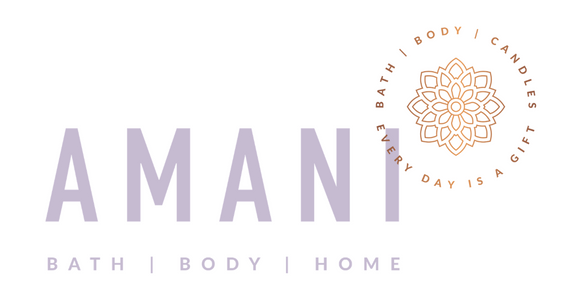FAQs
Who makes the Amani's products?
I do! I make everything in small batches in my Decatur, GA workshop. The only thing I sell that is not handmade are our wick trimmer scissors.
What are your products made from?
All our products are vegetarian; the majority are also vegan. I use plant-based oils and butters to make my soap, lotion, and candles. The most common oils I use are olive, coconut, rice bran, apricot kernel, and castor oil. I also use shea, cocoa, and mango butter. I use essential oils and fragrance oils to scent the soap and cosmetic mica as well as natural colorants to color it. Candles are paraffin-free and made with a blend of soy wax and coconut wax. Lip balm ingredients include beeswax, apricot kernel oil, cocoa butter, shea butter, coconut oil, and moringa oil.
My soap contains a variety of additives as well, but don't let the word "additive" worry you. The additives in my soap include sodium lactate, kaolin clay, and colloidal oatmeal. Here's why I've chosen to include them.
Sodium lactate is a kind of salt; it is moisturizing and helps to make a harder bar of soap. Since my products do not contain animal fats which contribute to a hard bar of soap (more on that below), this is pretty important.
Kaolin clay is a natural mineral which helps to draw out impurities in the skin and also help the product's scent to last longer. Some kaolin clays are also used to color soap.
Colloidal oatmeal is known for its soothing abilities and I include it to help create a very gentle bar of soap.
I heard you have to use lye to make soap?!! Isn’t that dangerous?
It is chemically impossible to make soap without lye (sodium hydroxide). Soap is the result of a specific chemical reaction between sodium hydroxide (a base) and fats/oils (an acid). When ingredients are combined in the proper amounts, the end result is soap + glycerin. There isn't any lye left after the saponification reaction as it has been transformed into soap. More on the glycerin below.
Lye is a caustic chemical that can be dangerous to use if you are not careful. But you can use it safely if you follow certain precautions such as wearing goggles and gloves, making sure you are in a well-ventilated area away from distractions and measuring very carefully. It’s applied chemistry and it is awesome!
But I’ve seen soap labels that don’t say lye!
That’s possible, but it's a bit deceptive. In cases where a soap label doesn’t say lye or sodium hydroxide, it will often say something like, “saponified oils of…” That’s what people put when they don’t want to say lye. Technically, it’s true but it really isn’t correct labeling. Other soaps might say something like, “sodium tallowate” or “sodium cocoate”. That’s just fancy speak for soap made from tallow and soap made from coconut oil.
I use the analogy of baking when talking about soap. If you are making a cake you have to use baking soda or powder. You can’t make one without it. But in the end, there isn’t any baking soda or powder left—it’s been transformed into a cake.
Are your products vegetarian?
Yes. Most are vegan as well. The only animal products I use are beeswax and goat’s milk.
Animal products such as tallow or lard do make a great soap, but I’ve found that most of my customers prefer vegetarian.
Why is handmade soap better than Dove or something else I can get at Walmart?
Soap from a big box store may be cheaper but it’s not better. The ingredients, time, research and skill necessary to formulate and create a good (and beautiful!) bar of soap cost money. The price I charge for my soap reflects these costs but I believe it is a fair price. Most of the soap sold at large retail stores is not a true “soap”; it is a chemical detergent. Yes, some detergents are gentler than others (like Dove) but they're still a detergent.
Remember the soap making reaction? Oils (acid) + lye (base) = soap + glycerin. The glycerin softens your skin and draws in moisture. Commercial soap making companies frequently extract that glycerin and sell it as a by-product. So most commercial products either don’t have the glycerin or they add some of it back later, which is a bit silly, don’t you think?
My soaps are made with a blend of oils and each one has its own unique properties in soap. You won't find that in Dove or other commercial brands. For example, coconut oil cleans really well. Olive oil is very gentle; organic, unrefined shea butter is moisturizing, etc. I have developed a recipe that selects certain oils in the right proportion to formulate a soap that has the desired qualities.
How can I make my soap last longer?
Keep it dry! Use a soap dish! The glycerin in handmade soap attracts water so it is easier for your soap to dissolve. Don't let it sit in a puddle of water. When you’re finished using it, make sure it is placed on a well-drained soap dish.
I have sensitive skin. What should I use?
All my soap is very gentle and designed to be good for your body or face. However, I don’t make medical claims about any of my products. If you are concerned that a bar of soap might be irritating, you could try it on your hands first before using it on your face or body.
I don’t like strong smelling soap.
If you want something with a subtle scent try Earl Gray or Oatmeal Goat's Milk. These are more lightly scented soaps.
What about allergens?
Many of my products contain shea butter, which can cause an allergic reaction in people with tree nut allergies. If you have a severe allergy, it’s probably better to be safe than sorry.
